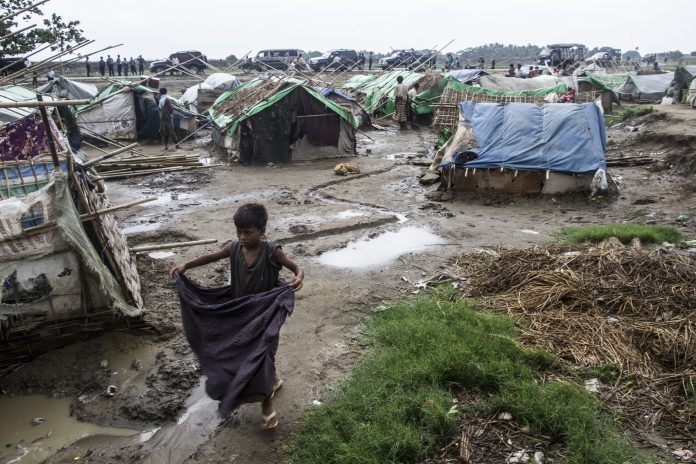European Union foreign ministers meeting in Brussels on February 26 agreed to prepare sanctions against Myanmar generals over the killings of Rohingya Muslims and to strengthen the EU arms embargo, accusing state security forces of grave human rights abuses.
The ministers called on the EU’s foreign policy chief, Federica Mogherini, to draw up a list of names to be hit with EU travel bans and asset freezes.
In a statement, ministers called for “targeted restrictive measures against senior military officers of the Myanmar armed forces responsible for serious and systematic human rights violations without delay”.
As reported by the Reuters news agency, the measures would be the EU’s toughest yet to try to hold the Myanmar military accountable for the abuses, likely joining US and Canadian sanctions already in place.
Reuters investigations have highlighted the killing of Rohingya Muslim men who were buried in a mass grave in Rakhine state after being hacked to death or shot by ethnic Rakhine Buddhist neighbours and soldiers.
In a statement released to the press, Tun Khin, President of the Burmese Rohingya Organisation UK said: “We welcome today’s decision by EU foreign ministers as much needed international action to protect the Rohingya from genocide. We now look to the EU to swiftly implement the policy it set out today.”
Anita Schug, European Rohingya Council Spokesperson, stressed the plight of the refugees. “We remain deeply concerned about the risk of forcible returns,” he said. “To mitigate this risk, EU states – from their embassies in Burma to their missions to the UN – must intensify efforts to press for UNHCR’s participation in the repatriation process. In addition, key issues, including citizenship status, numbers of refugees to be voluntarily repatriated, and freedom of movement, should be decided before returns begin. Therefore, refugees themselves must also be provided a seat at the table to determine their futures.”
To ensure the EU’s sanctions have the most impact, Kyaw Win, executive Director of Burma Human Rights Network, said these should focus on the economic interests of senior individuals in the Burmese military responsible for some of the worst atrocities taking place in Rakhine.
“Targeted sanctions should be seen as a means to the end, not the end itself by the EU,” said Kyaw Win, “Myanmar has refused entry for UN Special Rapporteur Yanghee Lee and the Human Rights Council’s Fact-Finding Mission. Reports about the military’s efforts to destroy evidence continue. Human rights are the silver thread through all of the EU’s policies.”
Win called on the EU to lead efforts to hold perpetrators accountable for the genocide occurring against the Rohingya. “We ask that the EU steer international efforts to refer Burma to the International Criminal Court (ICC) and, recognising the difficult path to the ICC, support universal jurisdiction cases.”

